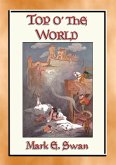Herein you will find 10 tales from the tiny island archipelago of Zanzibar - “The Spice Islands” of old. Stories like “The Kites and the Crows” – which tells why African Kites always fly away from Crows. The story of “The Ape, The Snake, And The Lion” which tells of poor ’Mvoo Laana, Neeo’ka the snake and Sim’ba the lion, and how ‘Mvoo gains riches for sparing the snake’s life teaching him the lessons of trust, kindness and loyalty. You will also find the stories of “Goso, the Teacher”, “Haamdaanee”, “The Magician and the Sultan’s Son” and many more. But why should such a small island have such a rich heritage of folklore? As far back as the 3rd C. Zanzibar was known to the Greeks and Romans. Later it was used by the Persians, Arabs, and Indians for trade and as a base for voyages between the Middle East, India, and Africa. Vasco da Gama's visit in 1498 marked the beginning of European influence. In 1698, Zanzibar fell under the control of the Sultanate of Oman and in the 1830’s Said bin Sultan moved his capital from Muscat to Zanzibar. In the 1800’s the Sultanate consolidated power around Ivory and the East African slave trade. In the mid-19th century as many as 50,000, mainly Negro, slaves passed annually through the port enroute to Arabia, Asia, Europe and the USA. The Zanzibar slave trade was finally abolished in 1873. After gaining independence from Britain in 1964, Zanzibar merged with mainland Tanganyika to form the modern nation of Tanzania. So, it is not surprising that this small island archipelago, just off the coast of Africa, should have such a rich and varied tapestry of culture and folklore. 33% of the net profit will be donated to SENTEBALE – a charity supporting children in Lesotho orphaned by AIDS.
Bitte wählen Sie Ihr Anliegen aus.
Rechnungen
Retourenschein anfordern
Bestellstatus
Storno









